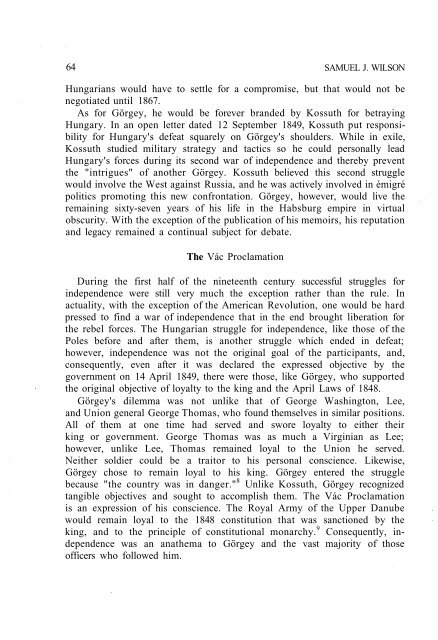64 SAMUEL J. WILSONHungarians would have to settle for a compromise, but that would not benegotiated until 1867.As for Görgey, he would be forever branded by Kossuth for betrayingHungary. In an open letter dated 12 September 1849, Kossuth put responsibilityfor Hungary's defeat squarely on Görgey's shoulders. While in exile,Kossuth studied military strategy and tactics so he could personally leadHungary's forces during its second war of independence and thereby preventthe "intrigues" of another Görgey. Kossuth believed this second strugglewould involve the West against Russia, and he was actively involved in émigrépolitics promoting this new confrontation. Görgey, however, would live theremaining sixty-seven years of his life in the Habsburg empire in virtualobscurity. With the exception of the publication of his memoirs, his reputationand legacy remained a continual subject for debate.The Vác ProclamationDuring the first half of the nineteenth century successful struggles forindependence were still very much the exception rather than the rule. Inactuality, with the exception of the American Revolution, one would be hardpressed to find a war of independence that in the end brought liberation forthe rebel forces. The Hungarian struggle for independence, like those of thePoles before and after them, is another struggle which ended in defeat;however, independence was not the original goal of the participants, and,consequently, even after it was declared the expressed objective by thegovernment on 14 April 1849, there were those, like Görgey, who supportedthe original objective of loyalty to the king and the April Laws of 1848.Görgey's dilemma was not unlike that of George Washington, Lee,and Union general George Thomas, who found themselves in similar positions.All of them at one time had served and swore loyalty to either theirking or government. George Thomas was as much a Virginian as Lee;however, unlike Lee, Thomas remained loyal to the Union he served.Neither soldier could be a traitor to his personal conscience. Likewise,Görgey chose to remain loyal to his king. Görgey entered the strugglebecause "the country was in danger." 8 Unlike Kossuth, Görgey recognizedtangible objectives and sought to accomplish them. The Vác Proclamationis an expression of his conscience. The Royal Army of the Upper Danubewould remain loyal to the 1848 constitution that was sanctioned by theking, and to the principle of constitutional monarchy. 9 Consequently, independencewas an anathema to Görgey and the vast majority of thoseofficers who followed him.
GÖRGEY, LEE, AND PERCEPTIONS 65Görgey's actions during this period are similar to those of Washington andLee. Görgey realized the importance of keeping his army intact as a fightingforce. According to Clausewitz, the first principal object in carrying on a waris "to conquer and destroy the enemy's armed forces." The Vác Proclamationkept the army alive and intact as an instrument that could be used to force acompromise with Austria based on the 1848 constitution. For Görgey, thearmy was loyal to King Ferdinand and fought the octroyed constitution. 10Like the American Continental Army, it was important for the Hungarianarmy to exist in order to achieve an equitable solution. Görgey approachedKossuth and the government more than once on the prospect of compromisewith Austria. 11 A battle won was the best declaration of independence. Thebayonet was necessary to gain Hungary's constitutional rights. 12 Like Washingtonand Lee, however, Görgey knew that the salvation of his country wasimpossible without foreign assistance. Washington received such help, and theAmerican colonies' struggle for independence was realized in 178<strong>1.</strong> Suchassistance never materialized for Lee or Görgey. Consequently, both of theirstruggles ended in defeat, a defeat Görgey knew as inevitable."In war," writes Clausewitz, "it is only by means of a directing spirit thatwe can expect the full power latent in the troops to be developed." Washington'ssuccess provides such a paragidm to judge Görgey's actions. Both hadthe love, loyalty, and respect of their troops. Their armies put their faith intheir commanders, who kept them together against tremendous odds andhardships. The Continental Army endured at Valley Forge because of theirfaith in their commander. Washington never allowed his army to be trappedor destroyed as a fighting force. He realized that as long as it existed, the goalsof the revolution could be achieved. Washington only had to hold out untilthe French and Spanish became involved on the American side. The British,however, had to destroy Washington's army as an effective fighting force orface defeat. Likewise, Lincoln and Görgey understood this important militaryaxiom. It took Lincoln until 1864 to find a general who understood that thedestruction of Lee's army was the principal Union objective. He found thatperson in Grant. 13 When Grant forced Lee to surrender, the war ended.Lincoln, however, had a distinct advantage not afforded to Görgey. Onereason the Union was saved was that the South was even more unprepared(having to raise an army from scratch) than the <strong>No</strong>rth. Although theAustrians, during the early stages of the revolution, were more concerned withevents in Italy and Bohemia, they still possessed an organized, trained, andequipped fighting force to use against Hungary when the opportunity presenteditself. Hungary, like the American colonies, had little time to organizeand equip a fighting force that could effectively resist and, if possible, defeat
- Page 1 and 2:
Papers of the Radnóti Memorial Con
- Page 3:
HUNGARIAN STUDIESVOLUME 11, 1996 CO
- Page 8 and 9:
6 GEORGE GÖMÖRIprobably Fürst an
- Page 10 and 11:
8 GEORGE GÖMÖRIof the utmost impo
- Page 12 and 13:
10 GEORGE GÖMÖRIén e földön...
- Page 14 and 15:
12 GEORGE GÖMÖRINotes1. Miklós R
- Page 16 and 17: 14 MIHÁLY SZEGEDY-MASZÁKself alwa
- Page 18 and 19: 16 MIHÁLY SZEGEDY-MASZÁKtype is r
- Page 20 and 21: 18 MIHÁLY SZEGEDY-MASZÁKpose, the
- Page 22 and 23: 20 MIHÁLY SZEGEDY-MASZÁK"Wozu Dic
- Page 24 and 25: 22 MIHÁLY SZEGEDY-MASZÁKand Wilme
- Page 26 and 27: 24 MIHÁLY SZEGEDY-MASZÁKbeen the
- Page 28 and 29: 26 MIHÁLY SZEGEDY-MASZÁKBolond, k
- Page 30 and 31: 28 MIHÁLY SZEGEDY-MASZÁK6. Emery
- Page 32 and 33: 30 ZSUZSANNA OZSVÁTHand breaks as
- Page 34 and 35: 32 ZSUZSANNA OZSVÁTHThe drama echo
- Page 36: 34 ZSUZSANNA OZSVÁTHcontinents at
- Page 39 and 40: FROM CAIN TO NAHUM 37which, as Csap
- Page 41 and 42: \FROM CAIN TO NAHUM 39and bears and
- Page 43 and 44: FROM CAIN TO NAHUM 41who sees what
- Page 45 and 46: FROM CAIN TO NAHUM 438. "A félelme
- Page 47 and 48: HELP ME, PASTORAL MUSE:THE VIRGELIA
- Page 49 and 50: HELP ME, PASTORAL MUSE 47compete! W
- Page 51 and 52: HELP ME, PASTORAL MUSE 49of a priva
- Page 53 and 54: HELP ME, PASTORAL MUSE 51Once again
- Page 55 and 56: HELP ME, PASTORAL MUSE 53Eighth Ecl
- Page 57 and 58: HELP ME, PASTORAL MUSE 55have that
- Page 59: HELP ME, PASTORAL MUSE 57Paul de Ma
- Page 62 and 63: 60 SAMUEL J. WILSONWe did, however,
- Page 64 and 65: 62 SAMUEL J. WILSONbeings and contr
- Page 68 and 69: 66 SAMUEL J. WILSONthe Austrians. G
- Page 70 and 71: 68 SAMUEL J. WILSONnorth-eastern Zi
- Page 72 and 73: 70 SAMUEL J. WILSONoriginally pursu
- Page 74 and 75: 72 SAMUEL J. WILSONGörgey's decisi
- Page 76 and 77: 74 SAMUEL J. WILSONfrom occurring,
- Page 78 and 79: 76 SAMUEL J. WILSON8. Artúr Görge
- Page 80 and 81: 78 STEVEN TÖTÖSY de ZEPETNEKtört
- Page 82 and 83: 80 STEVEN TÖTÖSY de ZEPETNEKThe c
- Page 84 and 85: 82 STEVEN TÖTÖSY de ZEPETNEKher u
- Page 86 and 87: 84 STEVEN TÖTÖSY de ZEPETNEKthe b
- Page 88 and 89: 86 STEVEN TÖTÖSY de ZEPETNEKrooti
- Page 90 and 91: 88 STEVEN TÖTÖSY de ZEPETNEKcriti
- Page 92 and 93: 90 STEVEN TÖTÖSY de ZEPETNEK'My f
- Page 94 and 95: 92 STEVEN TÖTÖSY de ZEPETNEKshe d
- Page 96 and 97: 94 STEVEN TÖTÖSY de ZEPETNEKNotes
- Page 99 and 100: BERLIN ET PARIS DE LAJOS TIHANYIVAL
- Page 101 and 102: BERLIN ET PARIS DE LAJOS TIHANYI 99
- Page 103 and 104: BERLIN ET PARIS DE LAJOS TIHANYI 10
- Page 105 and 106: BERLIN ET PARIS DE LAJOS TIHANYI 10
- Page 107 and 108: BERLIN ET PARIS DE LAJOS TIHANYI 10
- Page 109 and 110: BERLIN ET PARIS DE LAJOS TIHANYI 10
- Page 111 and 112: BERLIN ET PARIS DE LAJOS TIHANYI 10
- Page 113 and 114: BERLIN ET PARIS DE LAJOS TIHANYI 11
- Page 115: BERLIN ET PARIS DE LAJOS TIHANYI 11
- Page 118 and 119:
116 KEVIN E. KELLYfilms Lugosi made
- Page 120 and 121:
118 KEVIN E. KELLYthe provinces, no
- Page 122 and 123:
120 KEVIN E. KELLYWith his brief an
- Page 124 and 125:
122 KEVIN E. KELLYboth his and Dean
- Page 126 and 127:
124 KEVIN E. KELLYfollowed it into
- Page 128 and 129:
126 KEVIN E. KELLYvampiric nobleman
- Page 130 and 131:
128 KEVIN E. KELLYThe film also boo
- Page 132 and 133:
130 KEVIN E. KELLYWood remained one
- Page 134 and 135:
132 KEVIN E. KELLYLugosi, convinced
- Page 136 and 137:
134 KEVIN E. KELLY19. Lennig, 112-1
- Page 139 and 140:
THE AGON OF IRONY AND SATIREIN GYÖ
- Page 141 and 142:
THE AGON OF IRONY AND SATIRE 139poe
- Page 143 and 144:
THE AGON OF IRONY AND SATIRE 141tra
- Page 145 and 146:
THE AGON OF IRONY AND SATIRE 143fek
- Page 147 and 148:
THE AGON OF IRONY AND SATIRE 145ner
- Page 149 and 150:
THE AGON OF IRONY AND SATIRE 147whi
- Page 151 and 152:
THE AGON OF IRONY AND SATIRE 149mov
- Page 153 and 154:
THE AGON OF IRONY AND SATIRE 151for
- Page 155 and 156:
THE AGON OF IRONY AND SATIREA harma
- Page 157 and 158:
MURDER IN THE MOUNTAINSTranslated b
- Page 159 and 160:
MURDER IN THE MOUNTAINS 157"Afraid?
- Page 161 and 162:
MURDER IN THE MOUNTAINS 159Abády,
- Page 163 and 164:
MURDER IN THE MOUNTAINS 161"The mar
- Page 165 and 166:
MURDER IN THE MOUNTAINS 163Bálint
- Page 167 and 168:
MURDER IN THE MOUNTAINS 165"That is
- Page 169 and 170:
MURDER IN THE MOUNTAINS 167at hand,
- Page 171 and 172:
CONTRIBUTORSMiklós BÁNFFYLászló
















